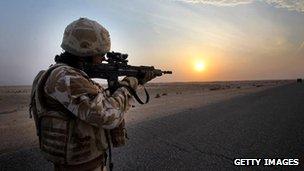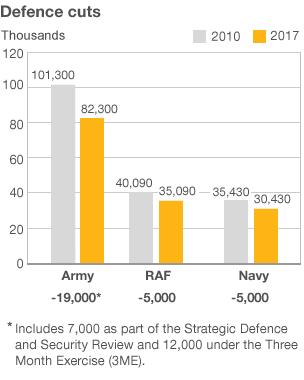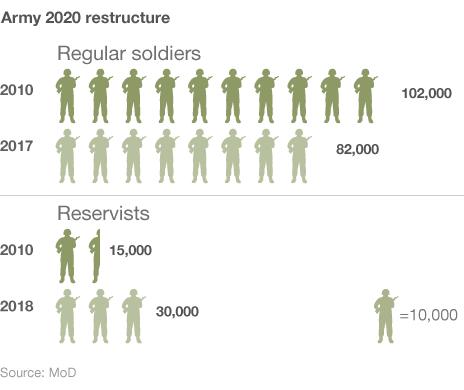Army redundancies: Soldiers told of fate
- Published

The Army is planning to reduce its regular fighting force to 82,000 by 2017
Nearly 4,500 Army personnel are being told they have been made redundant in the third and biggest round of job cuts since the 2010 defence review.
They are part of a long-term plan to cut the number of regular soldiers from 102,000 to 82,000. The government plans to increase the number of reservists.
Ministers said the cuts were "unavoidable" and the Army would be "more flexible and agile" in future.
But Labour said the plan was "flawed" and warned that Army morale was low.
Of the 4,480 Army personnel being made redundant, 3,765, or 84%, have volunteered for redundancy, the Ministry of Defence (MoD) said - up from 72% in the previous round of cuts.
There will 715 compulsory redundancies, making up 16% of the total.
Those serving in Afghanistan, and those preparing for or recovering from deployment, will not be made redundant in this round of cuts unless they have volunteered.
'Failing strategy'
Defence Secretary Philip Hammond said: "It is with great regret that we have had to make redundancies to deliver the reduction in the size of the armed forces, but unfortunately they were unavoidable due to the size of the defence deficit that this government inherited.
"Although smaller, our Armed Forces will be more flexible and agile to reflect the challenges of the future with the protection and equipment they need."
But shadow defence secretary Jim Murphy said: "The government has a flawed plan for reforming the British Army. There is a huge effort going into sacking soldiers but nowhere near as much is being done to plug the gap by recruiting new reservists."
The Labour MP added: "These redundancies represent not just broken promises but a failing strategy, and the level of voluntary applicants will be a signal of morale."
'Unsettling' process
The MoD aims to reach its target of 82,000 regular soldiers by 2017 while the number of reservists is to increase from 15,000, in 2010, to 30,000 in 2018.
The latest cuts - the largest single tranche of redundancies - come at a time when the MoD is still negotiating its budget settlement ahead of the Whitehall spending review on 26 June.
Maj Chris Braithwaite: "We feel really let down"
BBC defence correspondent Caroline Wyatt said the latest redundancies were a result of the almost 8% cut to the MoD's budget announced in 2010 - and a powerful reason why the department has argued it cannot face more cuts in manpower in the current spending round.
She said different ranks and fields of expertise had been chosen for redundancy, with volunteers asked to come forward.
The restructuring of the Army was an unsettling process for many soldiers and their families, she added.
Maj Chris Braithwaite, who left the Army this week after he was told a year ago he would be made redundant, said the timing meant he was 87 days short of being entitled to much better pension rights.
"We feel we've been let down and the trust we've placed in politicians and military leaders has not been repaid," he said.

Army Families Federation chief executive Catherine Spencer told the BBC it was a "really difficult day" for those who had been handed compulsory redundancies, "a day that they will have been dreading for some time, as they come to terms with considering where they're going to live, what job they'll do next, where their children will go to school".
But she praised the Army for "worked really hard" to make its redundancy package "really attractive".
The Army says that, even as it makes the latest redundancies, it still needs to recruit 10,000 new soldiers and officers this year, as well as 6,000 reservists.
It says this is necessary to keep its structure and age range in balance, with both soldiers and officers needing to start at the bottom of the hierarchy.
In response to a freedom of information request from the BBC, the MoD said the Army, navy and air force together recruited over 35,000 operational staff between October 2010 and February 2013.
Redundancy pay-outs for service personnel over the same period have totalled £194m, the MoD added.
Shadow Defence secretary, Jim Murphy: "A kick in the teeth for our armed forces".
The Army's Chief of the General Staff, General Sir Peter Wall, said: "We aren't just going to carry on doing the things we have in the past. We're going to put a greater dependence on reserves and contractors, as we have been to a large extent in Afghanistan.
"By doing things differently and by making sure that we focus our military manpower on the jobs that absolutely have to be done by people in uniform, we shall be able to sustain a brigade in the field on an enduring basis, and put a division into the field when we need to. We'll still be able to deal with the challenges of the future."
On Friday, he had warned gaps between military resources and planned capabilities caused by spending cuts "could become quite dangerous, quite quickly".
Prime Minister David Cameron, also speaking on Friday, said the UK had "very strong armed forces and ones the whole country can be proud of".
"We're not going to be making further cuts to the numbers of our Army, navy or air force, they know what they have available."
But he said "no department can be excluded from being efficient, from saving money, from making sure we get the best possible value for every pound that we take from the taxpayers and spend".

- Published14 June 2013
- Published10 June 2013
- Published18 June 2013
- Published29 May 2013
- Published13 January 2012